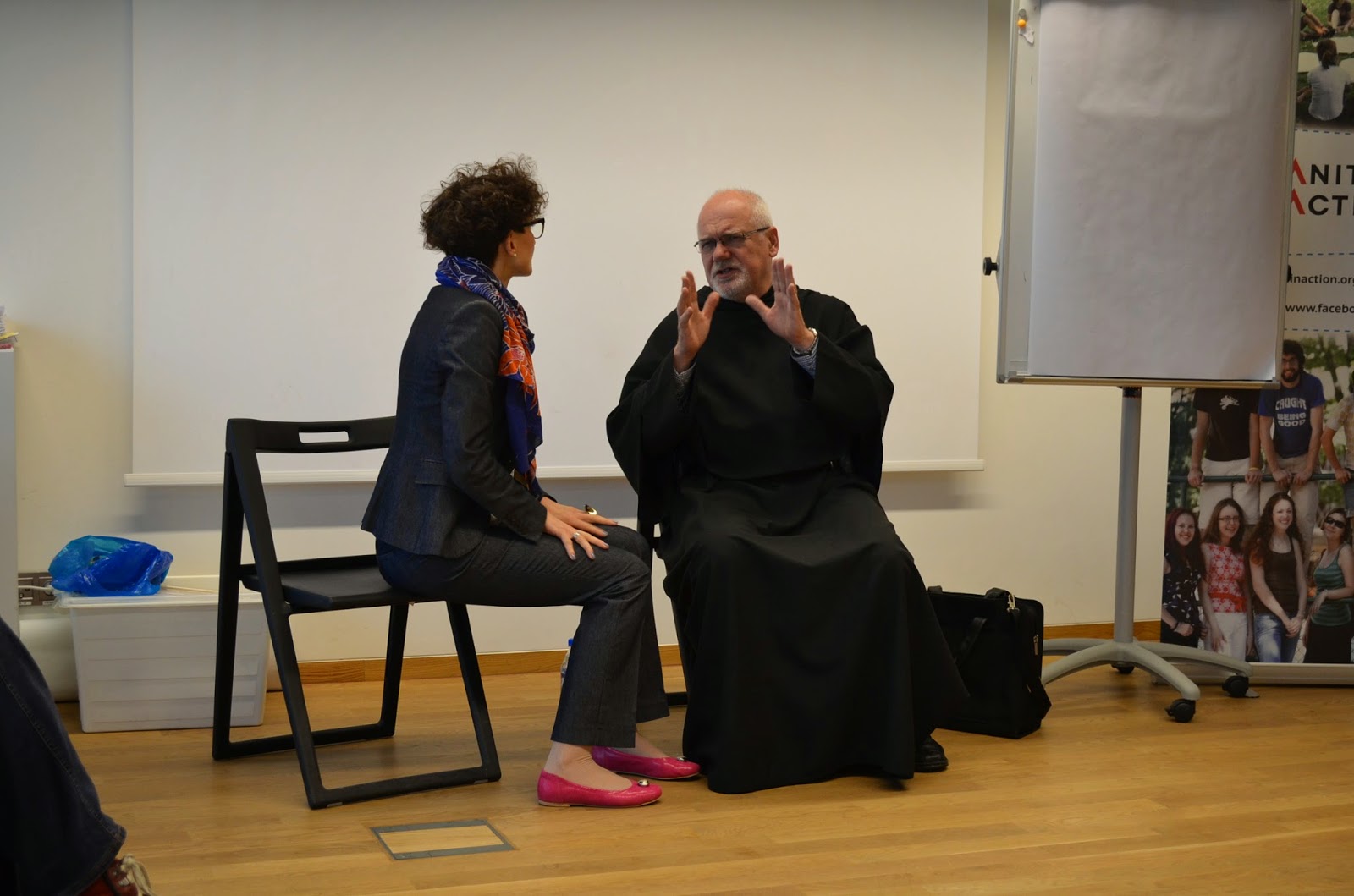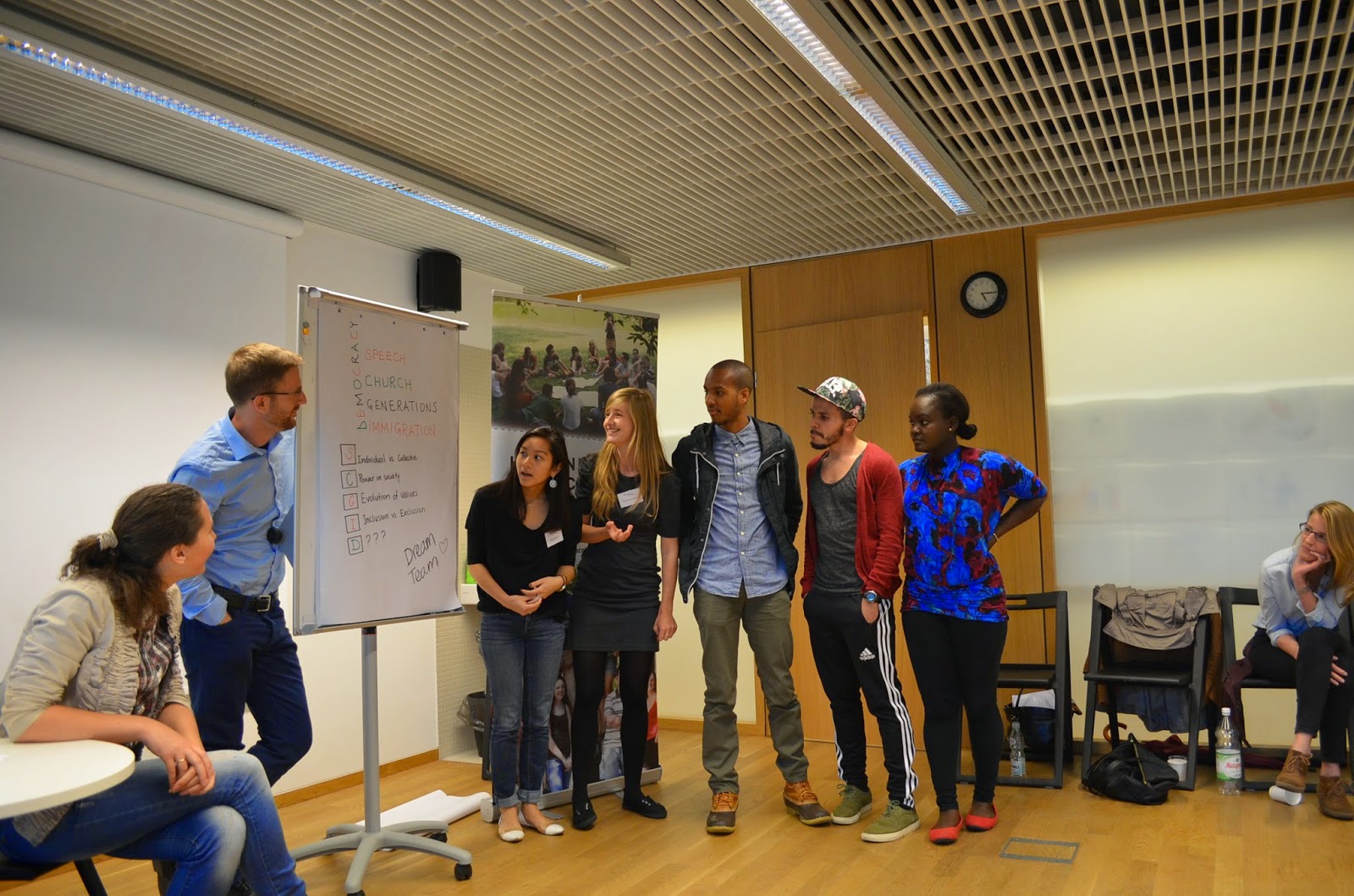by Anna Mykytenko, HIA Fellow
Nowadays, democracies all over the world meet new challenges, which they
need to confront with. People have to keep history in their memories and try to
understand it as well as they can to realize that there is a strong connection
between the past and present. This understanding is necessary to prevent bad
experiences in the future. Without understanding history, we can hardly be able
to know how to handle problems regarding human rights including freedom of
speech, migration, etc. All of these questions were raised during today’s
discussions.
.JPG) Today is June 3, one day before an outstanding anniversary in Poland –
the 25th anniversary of freedom, democracy, self-determination and
choice. During such a long period of time, a new generation was created with a
revived spirit of new time, with a different system of values and with a
changed way of thinking. These days usually inspire us to thoroughly consider
the past and present especially in terms of a reflection process as it was
defined by Prof. Stola. This
especially applies when our main discussion takes place in the Museum of the History of Polish Jews.
Today is June 3, one day before an outstanding anniversary in Poland –
the 25th anniversary of freedom, democracy, self-determination and
choice. During such a long period of time, a new generation was created with a
revived spirit of new time, with a different system of values and with a
changed way of thinking. These days usually inspire us to thoroughly consider
the past and present especially in terms of a reflection process as it was
defined by Prof. Stola. This
especially applies when our main discussion takes place in the Museum of the History of Polish Jews..JPG) This strong connection between the past and present can be seen
anywhere, but for me, it is extremely important to compare Poland and Ukraine
as neighboring countries, whose democracies are basically different nowadays. The
religion landscape and its role in
Poland can be mainly described through the Catholic Church which acted to unify
the nation, shelter the resistance and to protect from overwhelming Russian influence. Religion in Ukraine, as Reverend Wieslaw Dawidowski truly
noticed, is the rock on which makes divisions. Also, when comparing Poland and
Ukraine, it is extremely important for me as a Ukrainian citizen who seeks to examine
the Polish example as a case study to potentially learn the best practice for
building a democracy in Ukraine.
This strong connection between the past and present can be seen
anywhere, but for me, it is extremely important to compare Poland and Ukraine
as neighboring countries, whose democracies are basically different nowadays. The
religion landscape and its role in
Poland can be mainly described through the Catholic Church which acted to unify
the nation, shelter the resistance and to protect from overwhelming Russian influence. Religion in Ukraine, as Reverend Wieslaw Dawidowski truly
noticed, is the rock on which makes divisions. Also, when comparing Poland and
Ukraine, it is extremely important for me as a Ukrainian citizen who seeks to examine
the Polish example as a case study to potentially learn the best practice for
building a democracy in Ukraine..JPG)
In addition to history and religion, we have a list of contemporary topics we tackled that day. One of these issues is migration. Actually, I was surprised with some facts presented by Katarzyna Slubik from the Association for Legal Intervention because, unlike with the Ukrainian situation with migrants, the Polish situation seems be one that is improving. For instance, Polish NGOs have the right to monitor detention locations and present reports that could influence and improve conditions in those centers. However, I was much more amazed with the description of racism in Poland. There are really low numbers of hate crimes and the majority of hate speech incidents (which is mostly on the Internet); however, in Ukraine there are only a few hate crimes per year with presumably unfair statistics. We still have the same roots of hate crimes which are mostly violent attacks on ethnical background perpetrated mainly by young men under the influence of alcohol. This issue is still pretty challenging for our societies.
.JPG) The last session on counteracting anti-Semitism in Poland raised a great
discussion between the fellows because
it was our direct subject as it related to counteracting hate speech (according
to the key issue from the conversation with Jan
Herczynski). The Internet is a huge space for presenting ideas to the world
and these ideas may be equally liberal, democratic or directed against
humanity, dignity or justice. The point is to do our best to prevent hate speech since it may lead to human rights violations in general.
The last session on counteracting anti-Semitism in Poland raised a great
discussion between the fellows because
it was our direct subject as it related to counteracting hate speech (according
to the key issue from the conversation with Jan
Herczynski). The Internet is a huge space for presenting ideas to the world
and these ideas may be equally liberal, democratic or directed against
humanity, dignity or justice. The point is to do our best to prevent hate speech since it may lead to human rights violations in general. .JPG) It was really long day, full of surprises, challenges, dialogues…What
conclusion have I made on this day? Mostly I
understood the meaning of the word “diversity” and its value for
personal development and brining a new vision to the world. We had an exercise
where we had to choose five words to describe whole day. The fellows split into
three groups and each group wrote a completely different list of words to
describe today’s sessions. Diversity of views makes it possible to compare some
facts, to learn the lessons from the past, to prevent the same mistakes in
future and to provide the most efficient and just present. As for hate speech
or migration or anti-Semitism your country or culture is not a crucial issue (we
have very similar problems, however the desire to solve these problems plays a
key role), a new generation was born in the era of Internet democracy to meet
new challenges such as online hate speech or migration remembering and commemorating past experiences.
It was really long day, full of surprises, challenges, dialogues…What
conclusion have I made on this day? Mostly I
understood the meaning of the word “diversity” and its value for
personal development and brining a new vision to the world. We had an exercise
where we had to choose five words to describe whole day. The fellows split into
three groups and each group wrote a completely different list of words to
describe today’s sessions. Diversity of views makes it possible to compare some
facts, to learn the lessons from the past, to prevent the same mistakes in
future and to provide the most efficient and just present. As for hate speech
or migration or anti-Semitism your country or culture is not a crucial issue (we
have very similar problems, however the desire to solve these problems plays a
key role), a new generation was born in the era of Internet democracy to meet
new challenges such as online hate speech or migration remembering and commemorating past experiences. .JPG)
No comments:
Post a Comment